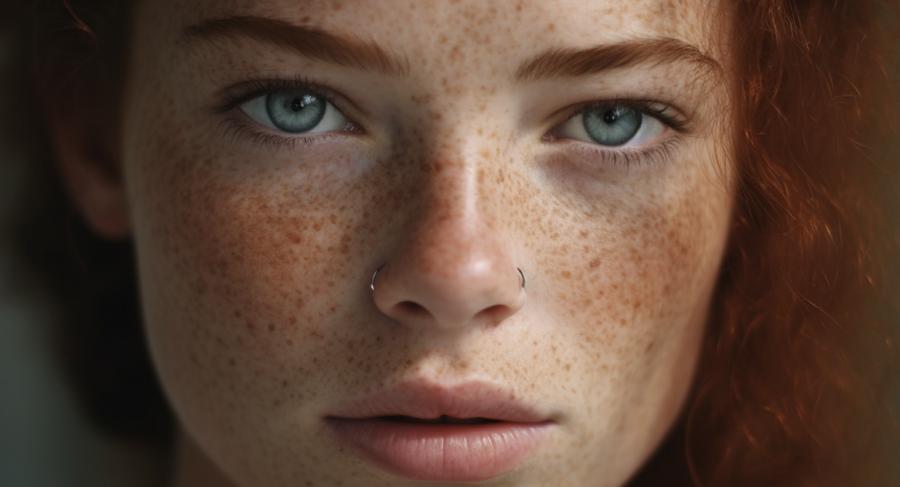Breaking Down the Beauty of Freckles

A Spotty Introduction
Have you ever wondered about the charming little spots that appear on the faces of some fortunate individuals? Yes, I'm talking about freckles - the delightful, celestial sprinkles that grace the faces of the young and the young-at-heart. These natural wonders are a source of fascination and envy for many, mostly because they lend an air of innocent mischief to those who bear them. But what are freckles, really? And why do some people have them while others don't? Let's explore the science and beauty of these melanin masterpieces together.Spotting the Origin of Freckles
Contrary to what we might like to believe, freckles are not the product of celestial star-dust or kisses from the sun. The truth is that freckles are simply areas of the skin where melanin, the pigment responsible for skin color, is produced and stored in greater amounts than usual. When exposed to the sun, the melanin-producing cells, called melanocytes, ramp up their activity, resulting in the formation of freckles. It's basically a defense mechanism against sun damage; the skin's very own, personalized little umbrellas, if you will.The Gene Pool Party
Now, why do some people have freckles while others don't? Let's dive into the ever-entertaining realm of genetics. Freckles are strongly influenced by genetic factors, particularly the MC1R gene. This gene plays a significant role in determining the type and amount of melanin produced by melanocytes. People with a particular variant of this gene have a higher chance of developing freckles, along with red hair and lighter skin tones. So, if you're a fellow freckle-bearer, you can thank your ancestors for passing down this lovely, spotty trait.Freckle Variety is the Spice of Life
Just like snowflakes or your favorite brand of potato chips, no two freckles are the same. In fact, there are several types of freckles, each with its own unique characteristics:- Ephelides: The most common type of freckle, these are flat, light brown or reddish spots that typically appear in childhood and tend to fade with age. Ephelides are most commonly found on fair-skinned individuals.
- Lentigines: Larger and darker than ephelides, lentigines are more permanent and do not fade with age. They can be found on all skin types and are often mistaken for moles.
- Sunburn freckles: As the name suggests, these freckles are the result of sunburn and may be larger, darker, and more irregular in shape than other types. They serve as a reminder to always slather on the sunscreen, folks!
Myth-Busting Freckle Facts
There's no shortage of myths and misconceptions about freckles, so let's set the record straight on a few of the most common ones:- Myth #1: Freckles are an indication of poor health. This is simply not true. Freckles are a natural pigmentation response to sun exposure and are not indicative of any underlying health issues.
- Myth #2: Freckles are caused by the sun. While sun exposure does play a part in the appearance of freckles, genetics are the primary factor. Some people are simply more predisposed to developing freckles than others.
- Myth #3: You can "catch" freckles from someone else. Nice try, but freckles are not the product of a contagion. They are a genetic trait, much like eye color or the inability to resist a good sale on shoes.
Embracing Your Freckled Fabulousness
Freckles have long been a topic of conversation and even controversy. Some people adore them, while others have resorted to creams, laser treatments, and even makeup to conceal them. But why hide such a beautiful, natural part of you?In recent years, freckles have been embraced by the fashion and beauty industries, appearing on the faces of models and celebrities alike. They've even inspired temporary freckle tattoos and "freckle pens" for those who want to join in on the freckle fun without committing to the real deal. It seems that freckle appreciation is on the rise, and for good reason - freckles are a unique and beautiful expression of our individuality and genetic heritage.
So, fellow freckle enthusiasts, wear your spots with pride! As the saying goes, "A face without freckles is like a night without stars." And who wouldn't want a little celestial sparkle on their face?
Article kindly provided by healthyvoices.net
Latest Articles
- How Oral Health Quietly Influences Energy Sleep and Long Term Well Being
- How Emotions Affect Your Skin
- Everyday Walks as Brain Games for Your Dog
- How Light Weights Can Build Serious Strength
- Missing Dental Supplies and What They're Really Telling You
- Rethinking Early Intervention Strategies for Childhood Behavior Support
- Keep Going: The Brain Science of Turning Setbacks Into Momentum
- Designing Movement Routines That Don't Feel Like Exercise
- Chair Yoga Works Wonders For Bodies Of All Ages
- Eyebrows Through the Ages and What They Reveal About Our Faces
- Feeding Plans That Keep Every Pet in Balance
- Hidden Immune Boost Hiding in Plain Sight for Corporate Travellers
- Evening Quiet Isn't Automatic and That's Perfectly Normal
- Quiet Power Makes a Salon Feel Like a VIP Retreat
- Chewing as Meditation and Everyday Calm
- Sleep Deprivation as a Social Problem, Not a Personal Failure
- Why Recovery Rituals Outlast Resolutions and Keep Us Moving Forward
- Desk Job Survival with a Side of Shoulder Rolls
- Why Your Living Room Layout Might Be Causing Your Back Pain
- Why Your Teeth Love Dental Hygienists
- Nutrition and Dietetics
- Exercise and Fitness
- Meditation and Yoga
- Mental Health
- Women's Health
- Men's Health
- Children's Health
- Senior Health
- Heart Health
- Sleep Health
- Skin Health
- Eye Health
- Dental Health
- Pain Management
- Addiction and Recovery
- Sexual and Reproductive Health
- Alternative Medicine
- Chronic Conditions
- Weight Management
- Occupational Health and Safety
- Public Health
- General Health Tips
- Beauty

